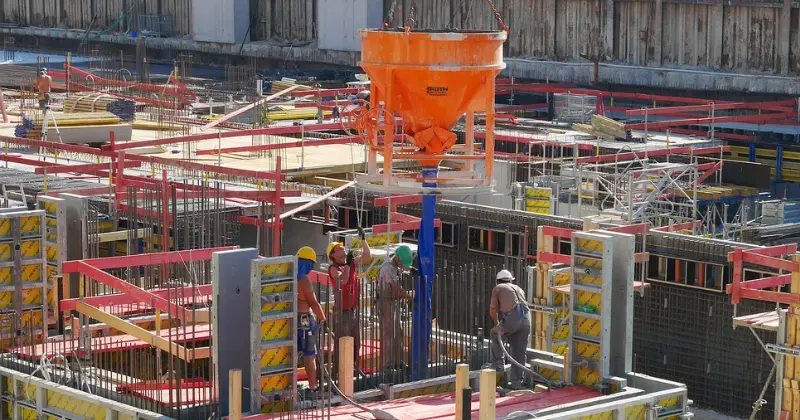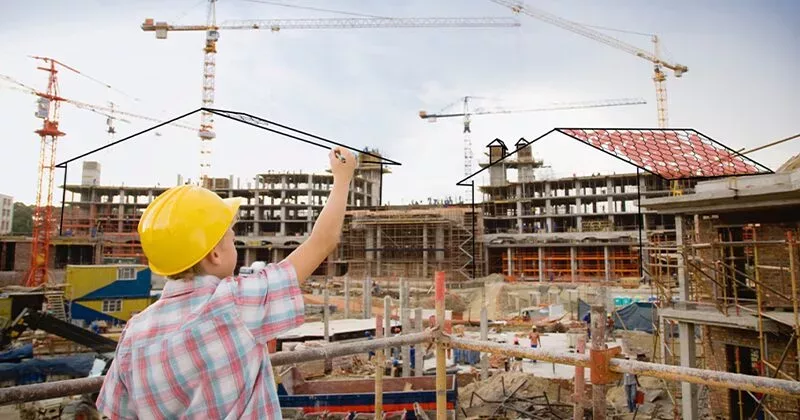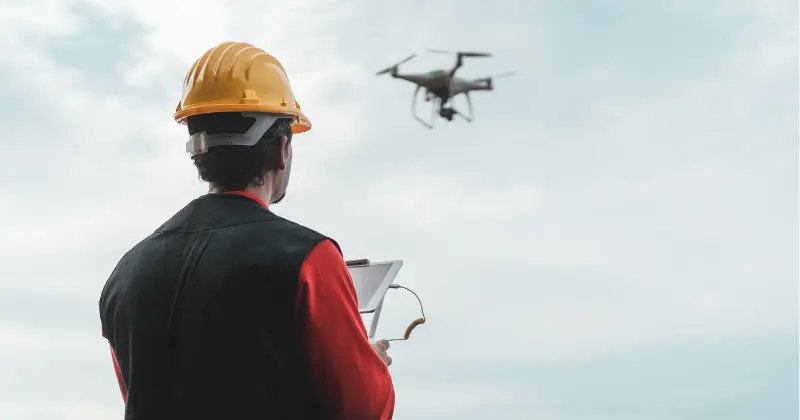11 mins read
What is a Construction Project Manager? A Deep Dive into This Crucial Role

- What is a Construction Project Manager?
- What Does a Construction Project Manager Do?
- Key Construction Project Manager Skills
- How Much Can You Earn as a Construction Project Manager?
- How to Become a Construction Project Manager?
- What Challenges Do Construction Project Managers Face
- What Kind of Software Do Construction Project Managers use?
- Final Thoughts
A successful construction project comprises many roles. Each role manages the different activities and processes related to their expertise and collaborates with others to meet the project’s objectives and requirements. Understanding the importance of these roles and the part each of them plays in the success of a building project is of utmost importance to thrive in our increasingly complex industry.
To help you understand this topic, we’ve compiled a new series of blog posts that dive into the different construction roles, providing details about key responsibilities, skills, potential salary, common challenges, and how modern software can help solve them. Whether you are a recent graduate looking to dive into a construction career or just curious about how this intricate industry functions, these blogs will provide you with all the knowledge you need.
Today, we will discuss one of the most crucial roles in construction: the project manager (PM). This high-level position oversees all aspects of a project and works closely with various stakeholders to ensure it is delivered on time, within budget, and precisely as the client expected.
Keep reading to learn more about this crucial role!
What is a Construction Project Manager?
A project manager (PM) oversees all aspects of a construction project to ensure it is delivered on time and within budget. The PM has substantial experience in the construction industry, which they apply to manage all processes effectively.
Any type of project requires a PM to manage all its aspects successfully. This role is even more important in the construction industry, as most of the structures being built will be populated by people who need to be safe while on it. This, paired with the increasing interest in building greener structures, makes the PM crucial to ensuring all construction phases are completed as expected and with the least environmental impact.
To do so effectively, the PM needs to collaborate with other stakeholders, such as architects, engineers, the general contractor, and others, to ensure all processes, activities, and teams are working as expected. The PM is the client’s point of contact, ensuring all requirements are met as agreed.
Project Manager vs Construction Manager
The construction project manager is often confused with the construction manager. This can happen because smaller construction firms might not have the budget to hire them for separate roles. However, this is often a setback because while the two have similarities, they are responsible for different aspects of the project and require different expertise.
On one side, the project manager oversees the project; they oversee the different activities from start to finish, ensuring that the client’s requirements and expectations are met throughout the project. On the other hand, the construction manager is a professional responsible for overseeing a project’s construction phase. They have expertise in building trades like electrical, plumbing, carpentry, and more, making them perfect for managing the day-to-day on-site operations. They are responsible for subcontractor management and ensuring that all on-site activities are completed on time and within budget.
What Does a Construction Project Manager Do?
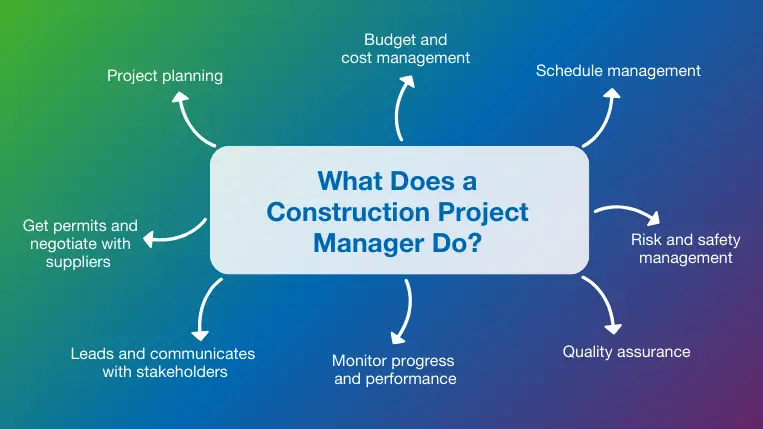
As mentioned above, the role of a construction project manager is to ensure that all aspects of the project meet the client’s expectations. This means they are responsible for many activities and processes. Implementing smart construction collaboration systems is of utmost importance to ensure that all of them are successfully completed. Let’s explore some of the key construction project manager responsibilities.
Project planning
One of the key construction project manager responsibilities is to develop a plan that outlines the project’s scope, main deliverables, timelines, budgets, and other resources and considerations required for successful completion. This helps to break down the project into manageable tasks that can be tracked and reported to ensure every small detail goes as expected.
Budget and cost management
Another crucial role responsibility is managing the budget and ensuring efficient cost control in construction projects. This involves cost estimation, setting up a budget, monitoring expenses, and making cost-effective decisions in collaboration with other stakeholders to ensure the project remains within budget and meets expected profitability.
Schedule management
Paired with construction budget management, PMs are also responsible for schedule management. This means ensuring all tasks and processes are organized to meet the project’s expected deadlines and allow a smooth transition from one phase to another. This is of the utmost importance, as any schedule delays can prolong the project and make it more expensive.
Risk and safety management
Another key responsibility of this role is developing a comprehensive construction risk management plan. This involves identifying key risks and challenges and analyzing their impact on the project. Some of the identified risks are easy to avoid, while others need mitigation strategies to reduce their impact. The PM must also understand key safety regulations to ensure compliance and efficient safety management.
Quality assurance
PMs are in charge of ensuring that the agreed quality standards are met. They do this by implementing professional construction quality assurance and quality control strategies in collaboration with other stakeholders. This helps them inspect the different tasks and activities to spot any issues in construction or noncompliance with legal standards and regulations.
Monitor progress and performance
As top-level management, project managers monitor progress and generate intuitive construction reports to inform all stakeholders about any issues or milestones. They are also responsible for keeping key documentation like drawings, specifications, or change orders up to date to prevent common communication issues that can lead to costly reworks.
Leads and communicates with stakeholders
One of the key responsibilities of the PM in their leadership role is to guide the different stakeholders and communicate with them to ensure smooth workflows. This includes setting clear roles and responsibilities for each team member, setting expectations for the work to be carried out, and facilitating communication channels to ensure all teams are connected and working towards common goals. It also involves having regular meetings with the client to report on progress or any other topics that come up.
Get permits and negotiate with suppliers
Project managers in construction are also responsible for securing permits and other legal requirements to carry out the work. They also hire and negotiate with contractors and suppliers to ensure favorable agreements for the project.
Key Construction Project Manager Skills
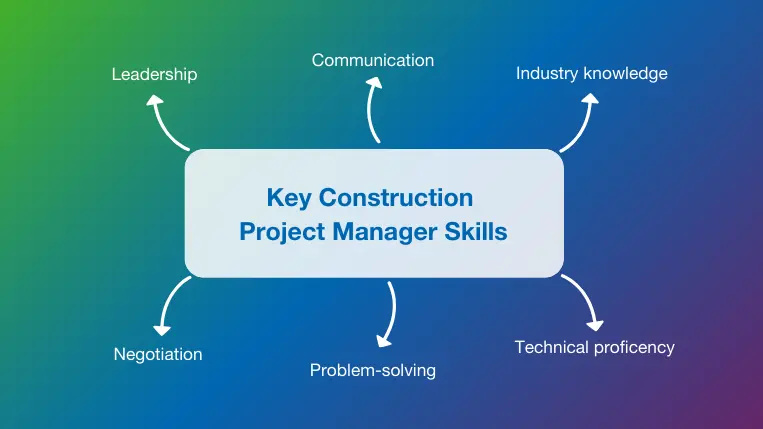
As you’ve learned by now, being a construction project manager is not easy. PMs are in charge of the entire project and are responsible for any issues or mistakes. That means they must have a complete set of skills to ensure they can carry out their work as expected. Let’s explore some of the skills below!
- Leadership: A professional PM must have good leadership skills. They must be capable of leading and motivating the different teams to complete their tasks promptly and efficiently while complying with legal standards and the client’s requirements.
- Communication: As part of their leadership role, PMs must also have excellent communication skills to be able to effectively transmit critical information about the project in a way that is understandable and engaging for the different stakeholders. This ensures that any changes are communicated promptly and solved efficiently.
- Industry knowledge: Industry knowledge is essential in a management role to understand how complex processes and activities work. Experience makes decision-making more effective and ensures the project’s success. This is one of the most important skills to have as a PM, as you will likely reach this position with it.
- Technical proficiency: Experience is critical to the PM role. However, the construction industry is more than just experience; PMs also need a high level of technical proficiency to benefit from the wide range of digital construction technologies available to them. This is a continuous learning process, as they also need to keep up with innovations in the technology department.
- Problem-solving: Unexpected changes or mistakes are normal in construction projects, but how these are managed is what really makes a difference. For that reason, PMs must also have powerful problem-solving skills to appropriately respond to these situations and mitigate their impact.
- Negotiation: As mentioned earlier, PMs ensure the project is delivered on time and within budget. To do so, they must negotiate with the different parties, including the client, team manager, contractors, and other suppliers, to ensure that deadlines and other aspects are respected and convenient. That is why negotiation skills are critical for this role.
How Much Can You Earn as a Construction Project Manager?
Construction project manager salaries can vary depending on the level of experience, certifications, size of the company, the country, and many other factors. However, there is still an average range for what a PM can expect to earn. To this date, the average base salary in the USA for this role is $93,971. In the UK, on the other hand, the average salary is £58,701 ($77,177).
How to Become a Construction Project Manager?
As the construction industry continues to grow, so will the demand for experienced project managers. The requirements for a PM position can vary from company to company; however, most companies seek a professional with extensive experience in the field. Let’s explore the educational path to becoming a construction project manager.
Education
Construction project managers typically have a bachelor’s degree in civil engineering, architecture, building science, or other construction-related studies, which are often around four years long. Some people might also pursue a shorter education with an associate’s degree in construction management, which can be complemented by work experience. That said, most companies consider a bachelor’s degree as entry-level education for this type of position.
Given the role’s importance, some may pursue additional certifications to differentiate themselves from other candidates. In the USA, the Project Management Institute (PMI) and the Construction Management Association of America (CMAA) are two of the various entities that offer such certifications. In the UK, professionals can go to the United Kingdom Accreditation Service (UKAS) or the PMI, which is also highly recognized in the region.
Training and Experience
Naturally, all the education in the world will not be enough without experience. It is in the field where you’ll learn everything you need to know to become a PM. Some people can start working in less high-level positions within a construction company and climb to a project manager role after years of experience. In contrast, others might start with apprenticeships in a construction company and build their experience from there. Generally, a bachelor’s degree and a couple of years of experience in the field are the winning combination for success.
What Challenges Do Construction Project Managers Face
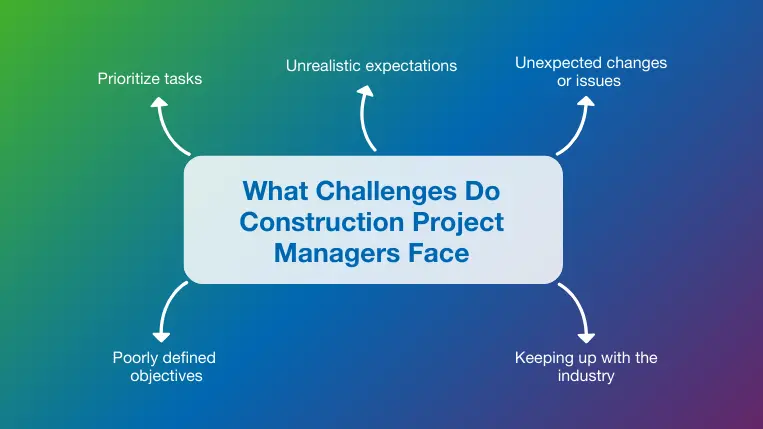
With responsibility comes challenges, and the role of project management in construction is not free of them. Juggling so many people and processes is not an easy task, especially in an industry that is becoming increasingly more complex. Some of the common challenges PMs face include:
- Prioritize tasks: It is important to prioritize and organize the different tasks in a way that makes sense not only from a schedule perspective but also from a budget perspective. This is not always easy, as ensuring all project pieces fit together into one schedule can be challenging.
- Unrealistic expectations: Managing the client’s expectations while keeping the project on time and within budget can also present a big challenge. As the industry becomes more competitive, clients want everything done for yesterday, and it is the PM’s job to ensure those expectations are managed in a way that does not affect the project’s final outcome.
- Unexpected changes or issues: We already mentioned that change is almost unavoidable in construction. However, addressing and resolving these changes or unexpected issues can challenge a PM, as they might need to reallocate resources or sacrifice their initial schedule.
- Keeping up with the industry: The construction industry never stops evolving. New regulations, technologies, and best practices are implemented regularly, making it challenging for project managers to keep up.
- Poorly defined objectives: Many construction project managers might struggle with their duties if goals are unclear. Unclear goals lead to misunderstandings between stakeholders that result in costly reworks and delays. Sure, project completion is always the end goal. However, each project is different and has specific requirements that will be the basis for the work to be completed. Using professional construction planning software is a good way of avoiding such challenges.
What Kind of Software Do Construction Project Managers use?
We’ve just discussed the challenges that PMs face in their daily operations. But how can they solve these challenges? The answer is technology. Modern construction project management software are the best support for building industry professionals who want to boost their operations and stand out from the competition. Below, we dive into some of the many tools that assist PMs.
Reporting & Analytics Software
As the key point of contact with the client, the PM needs to generate reports to track the project’s progress and inform the client about key milestones or developments. Reports are also powerful decision-making tools as they track data in real-time, allowing management to spot improvement opportunities or issues as soon as they arise.
RIB BI+ is a state-of-the-art construction data analytics and reporting platform that offers building industry professionals a centralized location to manage and visualize their most important data.
With a few clicks, reports in the form of interactive dashboards can be easily generated and shared online to ensure everyone has access to the latest information about the project. Amongst its many valuable functionalities, RIB BI+ has intuitive alarms to notify users as soon as a goal is reached or an anomaly is detected and a user role management feature to control who can access which data, among many other valuable things. This makes it one of the most powerful construction business intelligence software on the market.
Document Management Software
Another valuable tool used by PMs is construction document management software. In the past, construction companies managed all the documentation on paper, including drawings, specifications, contracts, and much more. This made it almost impossible to keep track of all changes and updates, leading to costly errors. Luckily, this is not the case anymore, as professional document management solutions allow companies to manage all important documents in an online environment, boosting collaboration and productivity.
A great example of such a solution is RIB CX. Our intuitive platform serves as a communication hub to capture all critical information about a project in a centralized location that all stakeholders can access.
This ensures everyone works from a single source of truth, preventing costly errors or delays. Paired with this, the software offers various modules to manage all critical information. For instance, the Publication Space module is where teams can securely share files, drawings, reports, contracts, schedules, and much more, updating the information in real-time.
Cost Management/Estimating Software
Estimating and managing costs is one of the most important and challenging aspects of a construction project. Like many other processes, estimating used to be done manually, resulting in errors that affected the entire project. While many professionals still rely on the traditional way of doing things, many others have embraced the power of modern estimating software to improve the accuracy and quality of their estimates.
RIB CostX is a state-of-the-art estimating and BIM takeoff software that digitizes the entire process for more accurate and agile estimations.
The platform supports a wide range of 2D and 3D design documents that can be live-linked to estimating spreadsheets to automatically reflect any design changes and analyze their impact. This allows for better decision-making and cost management.
Contract Management Software
One of the construction project manager’s responsibilities is to hire key stakeholders for the project and negotiate the terms of their contracts with them. This makes construction contract management software a fundamental tool for ensuring all documentation and relevant information is managed promptly and securely. Such tools contain the proper information to manage many construction contract types and their specific requirements, eliminating the risk of legal disputes or costly misunderstandings between parties. Plus, these solutions are usually powered by automation, which makes it way easier to record any changes made to the contract.
RIB Candy is a professional software with an intuitive interface that helps, among many other things, to manage contracts effectively for better results.
The tool assists project managers from tendering all the way to adjudication and final payments. Candy’s powerful reporting capabilities allow users to analyze data, track progress and key milestones, and manage change orders and variations in the most efficient way possible.
Final Thoughts
As you learned throughout this post, the role of a construction project manager is complex yet highly rewarding. PMs guide the different teams to ensure all tasks and processes are completed according to the client’s expectations, making them fundamental for successful completion. Professionals looking to become successful PMs need to gain a high level of experience in the industry, as this is one of the most important qualities employers seek.
However, it is not just about experience. In today’s digitally driven world, PMs must rely on technology to boost the project’s performance. At RIB Software, we are a leading provider of software solutions tailored to the needs of construction professionals. If you are looking for a software partner to skyrocket your project’s efficiency, productivity, and profitability, get a free demo of RIB’s toolkit today!
Most Recent
11 mins read
10 mins read
10 mins read
29 mins read
Blog Categories
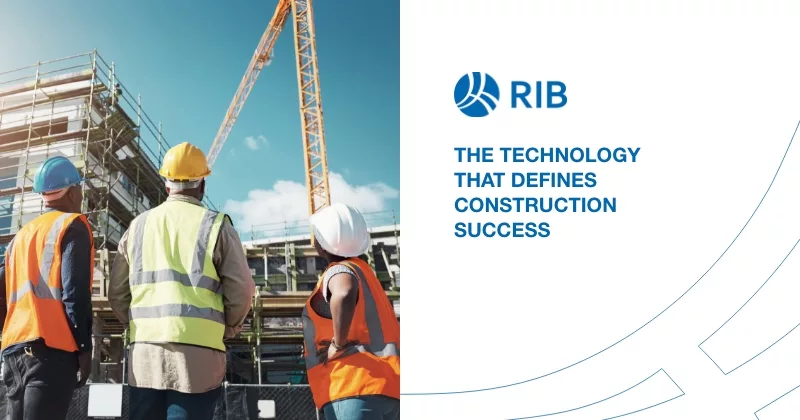
Ebook



